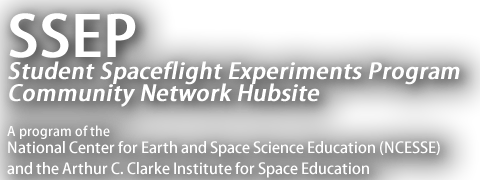This page provides a video archive of presentations at the annual SSEP National Conference by student researchers whose experiments were part of the SSEP Mission 20 to ISS Atlantis experiments payload. Mission 20 to ISS was the twenty-second SSEP flight opportunity.
The Atlantis experiment payload is currently scheduled to launch on SpaceX-34, in April 2026, from NASA Kennedy Space Center, Florida.
For details on the flight profile for Atlantis, see the SSEP Mission 20 to the International Space Station (ISS) page.
Some student flight teams present at more than one annual conference, reporting out status at various stages of the life cycle of a flight experiment. It is also true that not all student flight teams attend a conference. For details on all Atlantis flight experiments, see the Selected Experiments on SSEP Mission 20 to ISS page.
Fort Morgan, Colorado
Title: Effects of Zero Gravity on The Germination of Radishes in Hydrogel
Oral Presentation, 11th Annual SSEP National Conference, July 2025
Morgan Community College
Grade level: 14
Type of Experiment: Flight Experiment, Mission 20 to ISS
Co-Principal Investigators: McKayla Cranford, Cierra Lebsock
Teacher Facilitators: Bill Miller, Steve Sjostedt
Abstract: The ability to grow plants in microgravity is critical for the sustainability of long-term space missions. This study examines the effects of zero gravity on the germination and early development of radish (Raphanus sativus) seeds grown in a hydrogel medium. Radishes are selected for their fast growth cycle and potential as a space crop. The primary experiment aims to assess how microgravity influences germination rates, root orientation, and nutrient absorption compared to Earth-based controls.
Melbourne, Florida Team 1
Title: Investigating the Effects of Microgravity on Plant Genetic Transformation
Oral Presentation, 11th Annual SSEP National Conference, July 2025
Florida Institute of Technology
Grade levels: 14 and 16
Type of Experiment: Semi-Finalist Proposal, Mission 20 to ISS
Co-Principal Investigators: Davonya Cheek, Rahi Kashikar, Eva Bernadel
Teacher Facilitator: Dr. Andrew Palmer
Abstract: This proposal investigates the ability of Agrobacterium to conduct horizontal gene transfer under microgravity conditions. The project will involve the inoculation of tobacco seeds with A. tumefaciens and the addition of kanamycin ‘stop’ solution to arrest the transformation process after appropriate time frame to allow transformation to occur without causing damage to the seeds. Seeds will be extracted and put under simulated microgravity to examine the effects under fluorescence and grown to produce seeds to determine effect on future generations.
Melbourne, Florida Team 2
Title: The Impacts of Microgravity on Ciliary and Flagellar Development
Oral Presentation, 11th Annual SSEP National Conference, July 2025
Florida Institute of Technology
Grade level: 16
Type of Experiment: Finalist Proposal, Mission 20 to ISS
Co-Principal Investigators: Lucy Elizabeth Turner, Trevor Mello, Josh Ahrens
Investigator: McKenna Taylor
Teacher Facilitator: Dr. Andrew Palmer
Abstract: Cilia and flagella are known to be involved in vital biological processes such as breathing, reproduction, embryonic development, and brain maintenance. Malfunctions in these similar structures can be detrimental to human health. To model the effects of microgravity on human ciliary development, this experiment proposes culturing C. reinhardtii on the International Space Station (ISS) and studying the development of its flagella under microgravity conditions.
Melbourne, Florida Team 3
Title: Viability of Hydrogel Radiation Shielding Under the Influence of Microgravity
Oral Presentation, 11th Annual SSEP National Conference, July 2025
Florida Institute of Technology
Grade levels: Undergraduate and Graduate
Type of Experiment: Flight Experiment, Mission 20 to ISS
Principal Investigator: Leighton Karpinia
Investigators: Leyla Avant, Sampada Koirala
Collaborators: Emily Matheson, Caroline Moore
Teacher Facilitator: Dr. Andrew Palmer
Abstract: This study investigates the effects of microgravity on hydrogels used for radiation shielding. Without protection from the Earth’s atmosphere, astronauts and vehicles are susceptible to damage from ionizing radiation. Hydrogels are known to protect healthy tissues during radiation therapy and are promising for space applications. However, microgravity may influence particle aggregation, potentially diminishing hydrogels’ ability to shield from radiation by altering their structure. Understanding these effects will advance the use of hydrogels for protection during spaceflight missions.
